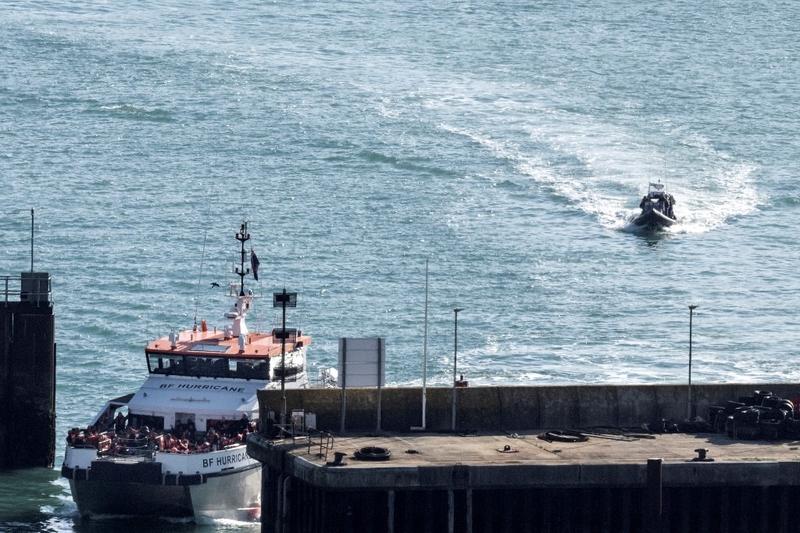 Ship BF Hurricane arrives in Dover carrying migrants picked up in the English Channel on Oct 18, 2022. (PHOTO / AFP)
Ship BF Hurricane arrives in Dover carrying migrants picked up in the English Channel on Oct 18, 2022. (PHOTO / AFP)
LONDON - Britain has set out details of a new law barring the entry of asylum seekers arriving in small boats across the Channel, a proposal some charities say could be impractical and criminalize the efforts of thousands of genuine refugees.
Prime Minister Rishi Sunak has made stopping boat arrivals one of his five key priorities after the number of migrants arriving on the south coast of England soared to more than 45,000 last year, up 500 percent in the last two years.
The new legislation will mean anyone who arrives this way will be prevented from claiming asylum and deported either back to their homeland or to so-called safe third countries.
Anger over immigration has played a defining role in British politics over the last decade and Sunak's Conservatives hope that by taking a hard line they can rebuild their popularity as they trail the main opposition Labour party by around 20 percentage points in opinion polls
Anger over immigration has played a defining role in British politics over the last decade and Sunak's Conservatives hope that by taking a hard line they can rebuild their popularity as they trail the main opposition Labour party by around 20 percentage points in opinion polls.
The UN's refugee agency said it was "profoundly concerned" by the proposals, which would deny people the right to asylum "no matter how genuine and compelling" individual cases may be.
The government said on the first page of the draft legislation that it may not be compatible with Britain's obligations under the European Convention on Human Rights, meaning it could face legal challenges if made into law.
Sunak said he would do "whatever is necessary" to stop the small boats and was ready to fight any legal challenges.
"We're up for the fight, I wouldn't be standing here if we weren't - but we're actually confident that we will win," he told a press conference.
The legislation will allow the detention of migrants without bail until they can be removed, interior minister Suella Braverman said, and those entering Britain illegally would no longer be able to use anti-slavery laws to try to block removal.
Only children, people who are considered too ill to fly or those at a "real risk of serious and irreversible harm" will be allowed to claim asylum in Britain.
Just under two-thirds of those who arrive on small boats are currently granted asylum or another form of humanitarian protection, interior ministry figures show.
READ MORE: Britain to detail plan to ban asylum for Channel migrants
While the number of applications for asylum in the UK hit a 20-year high of nearly 75,000 in 2022, it is still below the European Union average. Germany received more than 240,000 asylum applications last year.
Legal wrangling
Opposition politicians and charities have questioned whether the latest plans would be any more effective than previous attempts in the last five years to deter people from making the crossing.
Labour's home affairs spokesperson Yvette Cooper described the government's announcement as another "Groundhog Day" and said it should be working with other countries to address the matter.
Last year, Britain agreed a deal to send tens of thousands of migrants more than 6,400 km to Rwanda.
The first deportation flight was blocked by an injunction from the European Court of Human Rights. London's High Court then ruled it lawful in December, but opponents are seeking to appeal that verdict.
ALSO READ: UK PM, EU chief to meet over post-Brexit deals
Braverman said she was in discussions with the European human rights court to halt the use of injunctions to prevent the future deportation of migrants.
She suggested to parliament that without changes to the law, 100 million asylum seekers could qualify for protection in Britain, but didn't provide supporting evidence for that figure.


